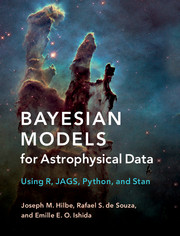Book contents
- Frontmatter
- Dedication
- Contents
- Preface
- 1 Astrostatistics
- 2 Prerequisites
- 3 Frequentist vs. Bayesian Methods
- 4 Normal Linear Models
- 5 GLMs Part I – Continuous and Binomial Models
- 6 GLMs Part II – Count Models
- 7 GLMs Part III – Zero-Inflated and Hurdle Models
- 8 Hierarchical GLMMs
- 9 Model Selection
- 10 Astronomical Applications
- 11 The Future of Astrostatistics
- Appendix A Bayesian Modeling using INLA
- Appendix B Count Models with Offsets
- Appendix C Predicted Values, Residuals, and Diagnostics
- References
- Index
- Plate section
- References
11 - The Future of Astrostatistics
Published online by Cambridge University Press: 11 May 2017
- Frontmatter
- Dedication
- Contents
- Preface
- 1 Astrostatistics
- 2 Prerequisites
- 3 Frequentist vs. Bayesian Methods
- 4 Normal Linear Models
- 5 GLMs Part I – Continuous and Binomial Models
- 6 GLMs Part II – Count Models
- 7 GLMs Part III – Zero-Inflated and Hurdle Models
- 8 Hierarchical GLMMs
- 9 Model Selection
- 10 Astronomical Applications
- 11 The Future of Astrostatistics
- Appendix A Bayesian Modeling using INLA
- Appendix B Count Models with Offsets
- Appendix C Predicted Values, Residuals, and Diagnostics
- References
- Index
- Plate section
- References
Summary
Astrostatistics has only recently become a fully fledged scientific discipline. With the creation of the International Astrostatistics Association, the Astroinformatics & Astrostatistics Portal (ASAIP), and the IAU Commission on Astroinformatics and Astrostatistics, the discipline has mushroomed in interest and visibility in less than a decade.
With respect to the future, though, we believe that the above three organizations will collaborate on how best to provide astronomers with tutorials and other support for learning about the most up-to-date statistical methods appropriate for analyzing astrophysical data. But it is also vital to incorporate trained statisticians into astronomical studies. Even though some astrophysicists will become experts in statistical modeling, we cannot expect most astronomers to gain this expertise. Access to statisticians who are competent to engage in serious astrophysical research will be needed.
The future of astrostatistics will be greatly enhanced by the promotion of degree programs in astrostatistics at major universities throughout the world. At this writing there are no MS or PhD programs in astrostatistics at any university. Degree programs in astrostatistics can be developed with the dual efforts of departments of statistics and astronomy–astrophysics. There are several universities that are close to developing such a degree, and we fully expect that PhD programs in astrostatistics will be common in 20 years from now. They would provide all the training in astrophysics now given in graduate programs but would also add courses and training at the MS level or above in statistical analysis and in modeling in particular.
We expect that Bayesian methods will be the predominant statistical approach to the analysis of astrophysical data in the future. As computing speed and memory become greater, it is likely that new statistical methods will be developed to take advantage of the new technology. We believe that these enhancements will remain in the Bayesian tradition, but modeling will become much more efficient and reliable. We expect to see more non-parametric modeling taking place, as well as advances in spatial statistics – both twoand three-dimensional methods.
Finally, astronomy is a data-driven science, currently being flooded by an unprecedented amount of data, a trend expected to increase considerably in the next decade. Hence, it is imperative to develop new paradigms of data exploration and statistical analysis.
Information
- Type
- Chapter
- Information
- Bayesian Models for Astrophysical DataUsing R, JAGS, Python, and Stan, pp. 364 - 365Publisher: Cambridge University PressPrint publication year: 2017
